The fine line betweem Desertion and Absence (1914)
Topic: Discipline
Manual of Military Law, 1914
Desertion, Fraudulent Enlistment, and absence without leave.
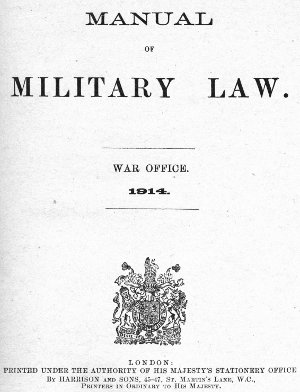 13. Desertion, Fraudulent Enlistment, and absence without leave.—A distinction is made by the [Army] Act between desertion and fraudulent enlistment. The latter, which is constituted a separate offence bu s. 13 is dealt with hereafter.
13. Desertion, Fraudulent Enlistment, and absence without leave.—A distinction is made by the [Army] Act between desertion and fraudulent enlistment. The latter, which is constituted a separate offence bu s. 13 is dealt with hereafter.
The criterion between desertion and absence without leave is intention. The offence of desertion—that is to say, of deserting or attempting to desert His Majesty's service—implies an intention on the part of the offender either not to return to His- Majesty's service at all, or to escape some particular important service as mentioned in para. 16; and a soldier must not be charged with desertion, unless it appears that some such intention existed. Further, even assuming that he is charged with desertion, the court that tries him should not find him guilty of desertion, unless fully satisfied on the evidence that he has been guilty of desertion. On the other hand, absence without leave may be described as such short absence, unaccompanied by disguise, concealment, or other suspicious circumstances, as occurs when a soldier does not return to his corps or duty at the proper time, but on returning is able to show that he did not intend to quit the service, or to evade the performance of some service so important as to render the offence desertion.
14. It is obvious that the evidence of intention to quit the service altogether may be so strong as to be irresistible, as, for instance, if a soldier is found in plain clothes on board a steamer starting for America, or is found crossing a river to the enemy; while, on the other hand, the evidence is frequently such as to leave it extremely doubtful what the real intention of the man was. Mere length of absence is, by itself, of little value as a test, for a soldier who has been entrapped into bad company through drink, or other causes, may be absent some time without any thought of becoming a deserter but in the case above put, of a soldier found on board a steamer starting for America, there could be no doubt of the intention, though he might only have been absent a few hours.
15. Nor can desertion invariably be judged by distance, for a soldier may absent himself without leave and depart to a very considerable distance, and yet the evidence of an intention to return may be clear; whereas he may scarcely quit the camp or barrack yard, and the evidence of intention not to return (by the- assumption of a disguise, for example, and other circumstances may be complete.)
16. A man who absents himself in a deliberate or clandestine manner, with the view of shirking some important service, though he may intend to return when the evasion of service is accomplished, is liable to be convicted of desertion just as if an intention never to return had been proved against him. Thus if a man on the eve of the embarkation of his regiment for foreign service, or when called out to aid the civil power, conceals himself in barracks, the court will be quite justified in presuming an intention to escape the important service on which he was ordered and in convicting him of desertion.
17. A man may be a deserter though his absence was in the first instance legal (e.g., being authorised by leave on furlough), the criterion being the same in all cases, namely, the intention of not returning. It is clearly shown by the King's Regulations, and by returning, the explanation on the furlough itself, that a soldier on furlough is still under orders, and that, if without leave, he quits the place to which he has permission to go, or if he disguises or conceals himself so that orders cannot reach him, or if he goes on board a ship about to sail for a distant port, he is liable to be tried and convicted of desertion though on furlough at the time. A soldier, for example, at Ipswich, who obtains a pass to Bristol, and during his leave when without permission to go to Liverpool is found there in civilian costume on board a ship about to sail for New York, may be tried for desertion. It would be for him to show that the absence without leave from Bristol proved against him. was innocent, and had nothing to do with desertion.
18. If a soldier commits an act which is apparently a prelude to, or an attempt at, desertion, although no actual absence can be proved, as if he is caught in the act of slipping past a sentry, or climbing over a barrack wall in plain clothes, he may be charged with an attempt to desert.
19. The fact that a soldier surrenders is not proof by itself that he intended to return, even though he is in uniform at the time of surrender. The prosecutor may not be able to prove where the man has been during his absence, but evidence that the military patrols had searched carefully in the neighbourhood of the barracks without finding him, would show that he must have gone to a distance or concealed himself. From this and other circumstances the court may infer that he surrendered because he could not effect his contemplated escape.
20. A soldier charged with desertion may be found guilty of attempting to desert or of being absent without leave; and, on the other hand, a soldier charged with an attempt to desert may be found guilty of actual desertion or of being absent without leave (a). In any case of doubt as to whether one or the other offence has been committed, the court should find the prisoner guilty of the less offence. A soldier guilty of desertion forfeits, if serving on his original engagement, the whole of his prior service, and, if sering on a re-engagement, all prior service rendered during the period of re-engagement, and is liable to serve for the term of his original enlistment, or re-enegagement as the case may be, reckoned from the date of his conviction, or of the order dispensing with his trial (b).
21. As a general rule, a soldier quitting his corps and enlisting in another should not be charged with desertion, but with fraudulent enlistment for the very act of his enlisting in another corps (unless in an exceptional case) shows that he did not intend to leave His Majesty's service. On the other hand, if he does so for the purpose of avoiding a particular service—e.g. service abroad—or if during his absence he conducted himself so as to show that when he quitted he did not intend to return to the service, but changed his mind he is, as above pointed out, guilty of desertion, and may be tried But as already observed, it will suffice, except in very accordingly. for fraudulent enlistment alone.
The 1907 edition of the
Manual of Military Law an be found online at the internet archive.

Posted by regimentalrogue
at 12:01 AM EDT
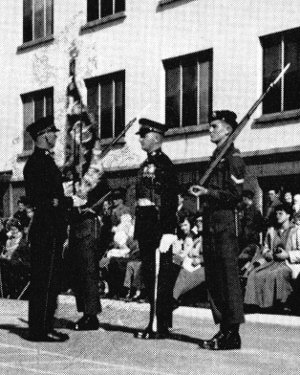 London, Ontario — 19th October, 1957
London, Ontario — 19th October, 1957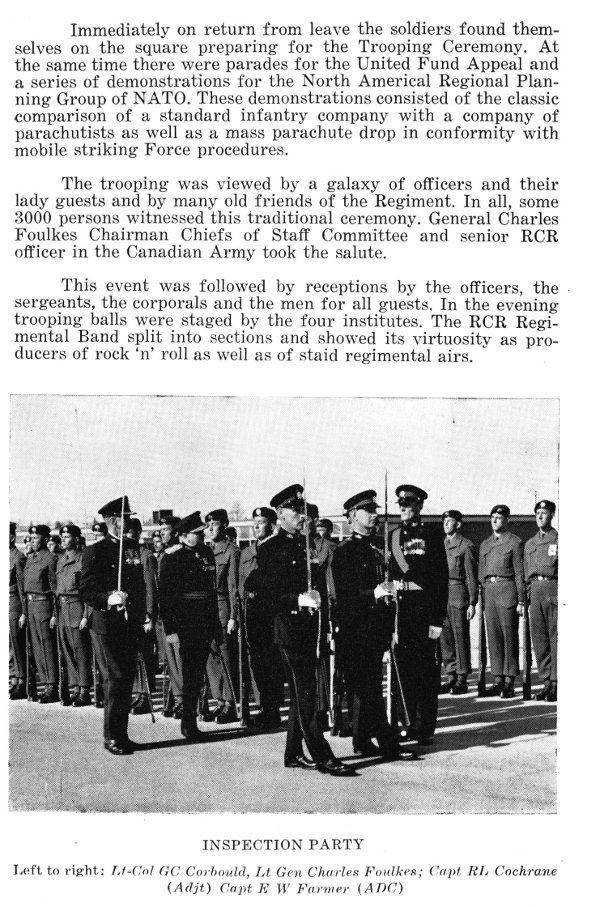


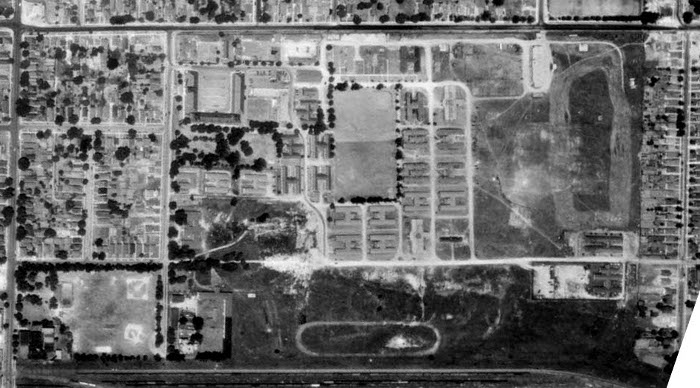
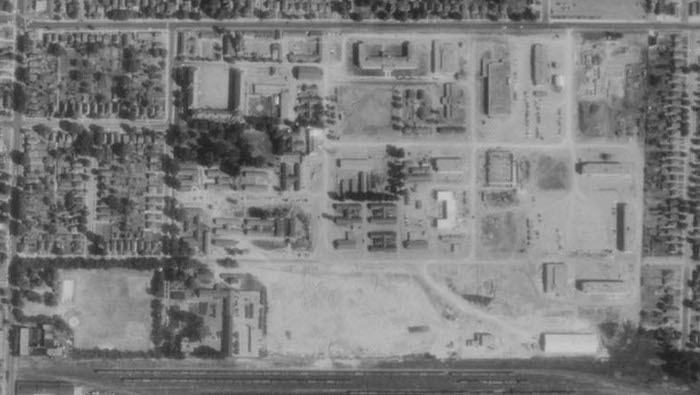
 The original text of the Royal Warrant as published in the London Gazette authorisng the intitution of the Military Medal follows:
The original text of the Royal Warrant as published in the London Gazette authorisng the intitution of the Military Medal follows: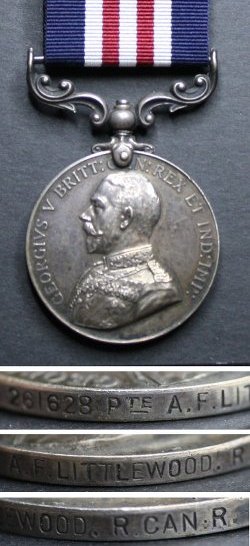 Awards to Canadians
Awards to Canadians

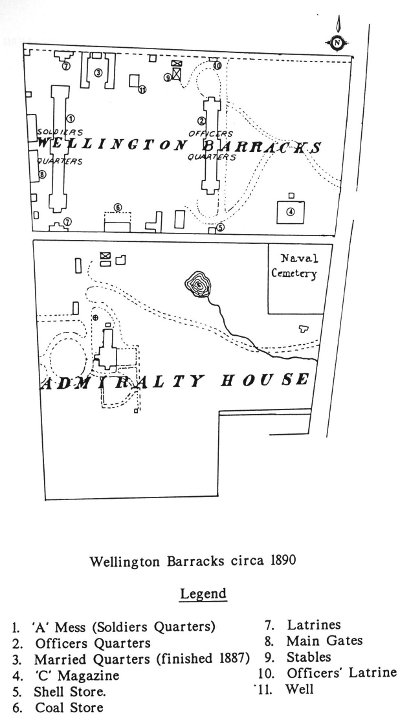 These new barracks would also be built to the newest standards, meeting the high expectations of the reform movement seeking to improve living conditions then gaining strength in England. Accordingly, as quoted in "A Brief History of Wellington Barracks" by Barbara Winters (1989), it would include:
These new barracks would also be built to the newest standards, meeting the high expectations of the reform movement seeking to improve living conditions then gaining strength in England. Accordingly, as quoted in "A Brief History of Wellington Barracks" by Barbara Winters (1989), it would include: In 1917, Arthur Guy Empey, an American who served in France with the British Expeditionary Force, wrote the book "Over the Top." Pitched to the growing public interest in the War in the United States, Empey's story of his service, from his decision to go to England to enlist after the sinking of the
In 1917, Arthur Guy Empey, an American who served in France with the British Expeditionary Force, wrote the book "Over the Top." Pitched to the growing public interest in the War in the United States, Empey's story of his service, from his decision to go to England to enlist after the sinking of the 



 For guidance on wearing of medals and ribbons, see the following guide:
For guidance on wearing of medals and ribbons, see the following guide: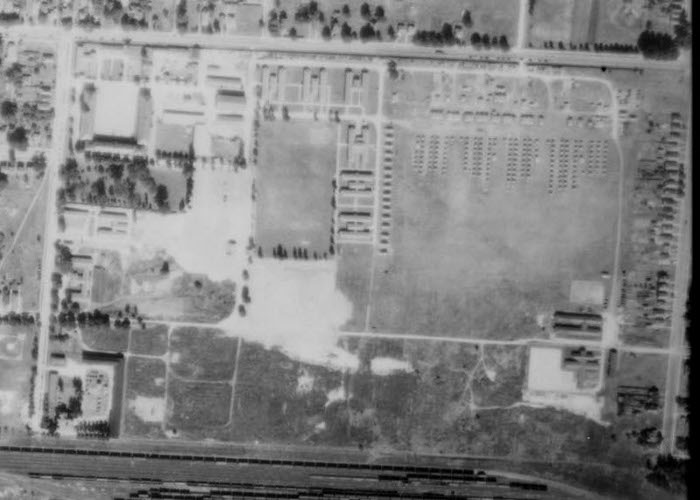
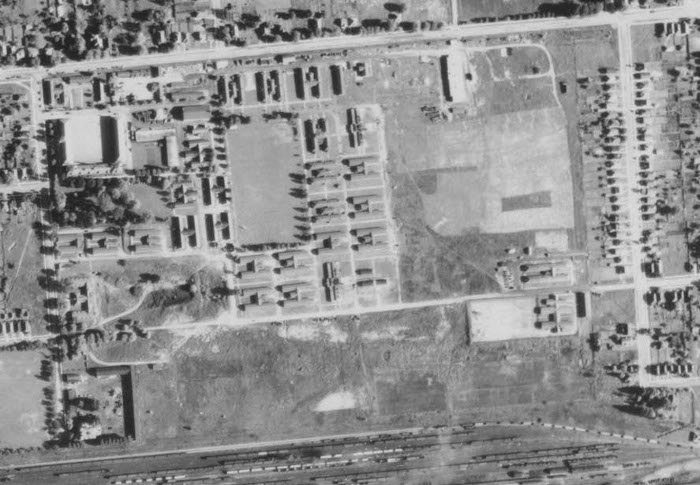
 The C.E.F. Roll of Honour (1996)
The C.E.F. Roll of Honour (1996) Mentioned in Despatches of the C.E.F. (2000)
Mentioned in Despatches of the C.E.F. (2000) Guests of the Kaiser; Prisoners of War of the CEF 1915-1918 (2008)
Guests of the Kaiser; Prisoners of War of the CEF 1915-1918 (2008)
 Over 350,000 Canadians received the
Over 350,000 Canadians received the 
 While I do not know where the Canadian Forces currently stands on the possibility of Battle Honours being awarded for
While I do not know where the Canadian Forces currently stands on the possibility of Battle Honours being awarded for 


 The Royal Canadian Regiment
The Royal Canadian Regiment Anyone who has followed the news reporting around
Anyone who has followed the news reporting around 
 Sacred Places; Canadian Cemeteries of the Great War
Sacred Places; Canadian Cemeteries of the Great War Remembered; The History of the Commonwealth War Graves Commission
Remembered; The History of the Commonwealth War Graves Commission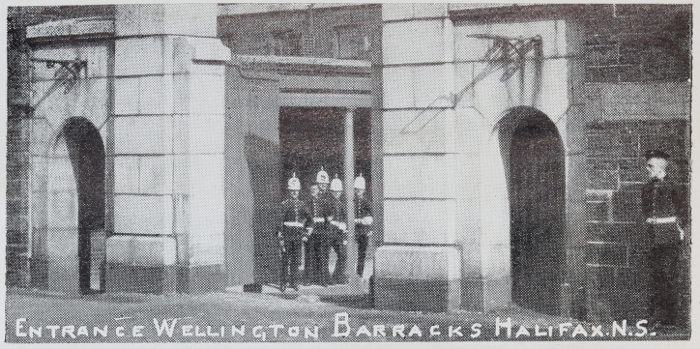
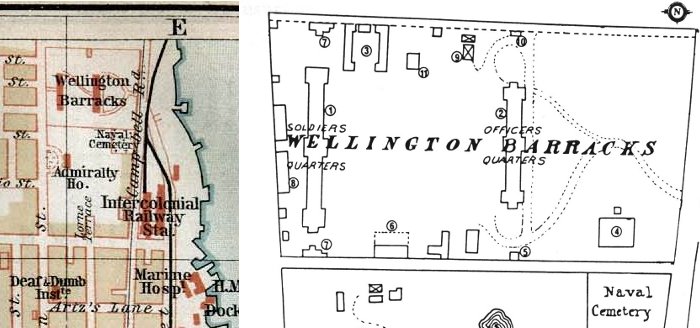



 Militia General Orders
Militia General Orders It was during the first Fenian raids in 1866, that the only Victoria Cross to be awarded for actions in Canada was granted. This award, for an act of gallantry not in the presence of the enemy (which was allowed by the terms and conditions for the VC for a brief period) was earned by
It was during the first Fenian raids in 1866, that the only Victoria Cross to be awarded for actions in Canada was granted. This award, for an act of gallantry not in the presence of the enemy (which was allowed by the terms and conditions for the VC for a brief period) was earned by  From the excellent British service medals reference "
From the excellent British service medals reference " 13. Desertion, Fraudulent Enlistment, and absence without leave.—A distinction is made by the [Army] Act between desertion and fraudulent enlistment. The latter, which is constituted a separate offence bu s. 13 is dealt with hereafter.
13. Desertion, Fraudulent Enlistment, and absence without leave.—A distinction is made by the [Army] Act between desertion and fraudulent enlistment. The latter, which is constituted a separate offence bu s. 13 is dealt with hereafter.
 Connecting File, January, 1946
Connecting File, January, 1946
